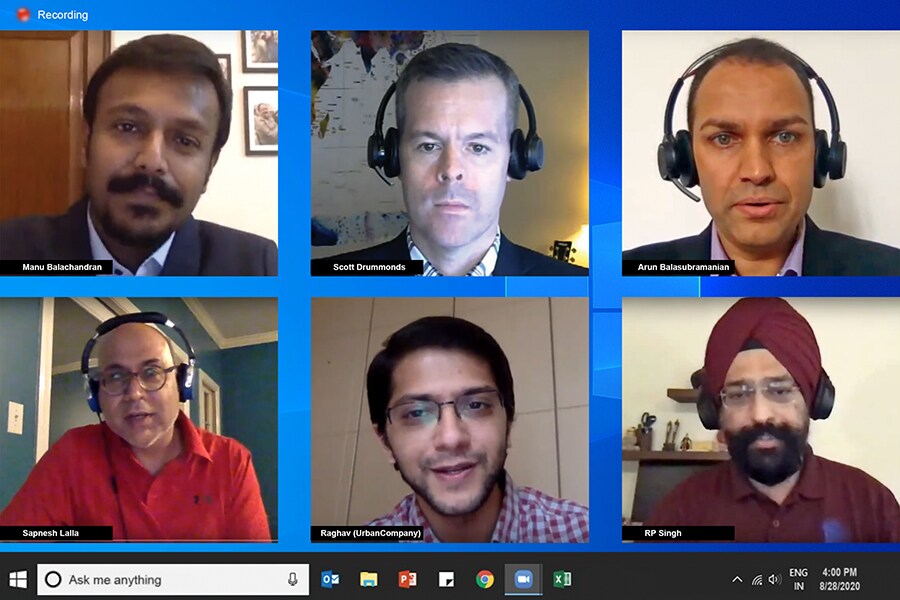Digital solutions for people and processes to drive better outcomes
The digital technology facilities enterprises in the new normal


After five long months since the first pandemic-triggered lockdown was announced in India, individuals and businesses have settled into the ‘new normal’. Work from home and virtual meetings have become a way of life. The transformation does, however, still have some challenges that must be grappled with. Businesses seek ways to further streamline workflows, improve productivity and develop team cultures. Enterprises have also begun to plan for a future that entails, more often than not, a hybrid model that includes some elements of work from home. Last, but not the least, leaders with foresight are contemplating strategic shifts in the use of technology to ensure Business Continuity in the event of future crises and disruptions.
Forbes India CXO Speak, hosted by Forbes India in partnership with ServiceNow, brought together thought leaders who have made the entire transition to work from home more seamless. Raghav Chandra, co-founder and CTO, Urban Company Sapnesh Lalla, CEO, NIIT Ltd Dharmendra Kapoor, CEO and MD, Birlasoft Ravi Pratap Singh, CEO, Nucleus Software Arun Balasubramanian, MD – India & SAARC, ServiceNow and Scott Drummonds, AVP, Solution Consulting, APJ, ServiceNow, shared their experiences and insights on these themes.
Many interesting insights on the role of CXOs in fostering and sustaining team-spirit among employees and facilitating them with access to suitable technology tools emerged. Building employee resilience, creating a remote work culture and fostering a sense of responsibility in the new scenario have become the concerns of the C-suite. The discussion began with Raghav Chandra stating, “Although employees were adapting to the new setup and working hard to sustain productivity, the remote working scenario necessitated managing burnout.” In response, Ravi Pratap Singh suggested, “While tools and technology are available, employees had to adopt a new discipline.” At the same time, he declared that trust has become the new currency, which can motivate speed and productivity better than any other management principle. Even once a solution has been implemented for the ongoing crisis, a hybrid model – work from home and office - is expected to continue, wherein trust in people and building relationships will be significantly more important. Naturally, to adapt to this model more permanently will call for new skills and technology tools.The panellists also deliberated on the changing patterns in the use of technology. Using the cloud was gradually gaining popularity in pre-Covid times. However, with the pandemic necessitating remote and hybrid work location models and the heightened need for information security and cyber security, corporates of various sizes were rapidly adopting cloud services. Further, Dharmendra Kapoor observed that companies are realising that as cost savings has become a priority, doing more with less would only be possible with significant automation at all levels of the organisation. Sapnesh Lalla pointed out that while technology provides the opportunity to gauge productivity remotely, using it to ‘track or watch’ employees would become counter-productive instead it should be used to inspire them to do more. In effect, new human resource policies should be instituted that build in greater flexibility while working from home and remotely.
For success in the work from home model, processes must be seamless and not disconnected. Consequently, many enterprises are re-engineering the way they envisage their overall work spaces. They are also changing the way they engage with their customers. Digital can provide solutions in both these domains and create some great experiences for employees, allowing them to engage with their customers in a whole new way. The major caveats are the need for security and ensuring business continuity.
There was a consensus that technology and people engagement across various stakeholders will see a major investment in the new normal.
The panellists agreed that enterprises are ultimately built on the strength of people – employees and customers. Sparking resilience by ensuring that employees enjoy their work experiences, would nurture the desire to keep working. Staying in touch with them, ensuring their wellbeing and providing them with the tools to get their jobs done would determine the level of successful of a business, going forward.
All things considered, the crisis has presented companies with a great opportunity to re-engineer processes, focus on health and wellbeing and build relationships and partnerships afresh.
Disclaimer: The views, suggestions and opinions expressed here are the sole responsibility of the experts. No Forbes India journalist was involved in the writing and production of this article.
First Published: Sep 14, 2020, 10:18
Subscribe Now
